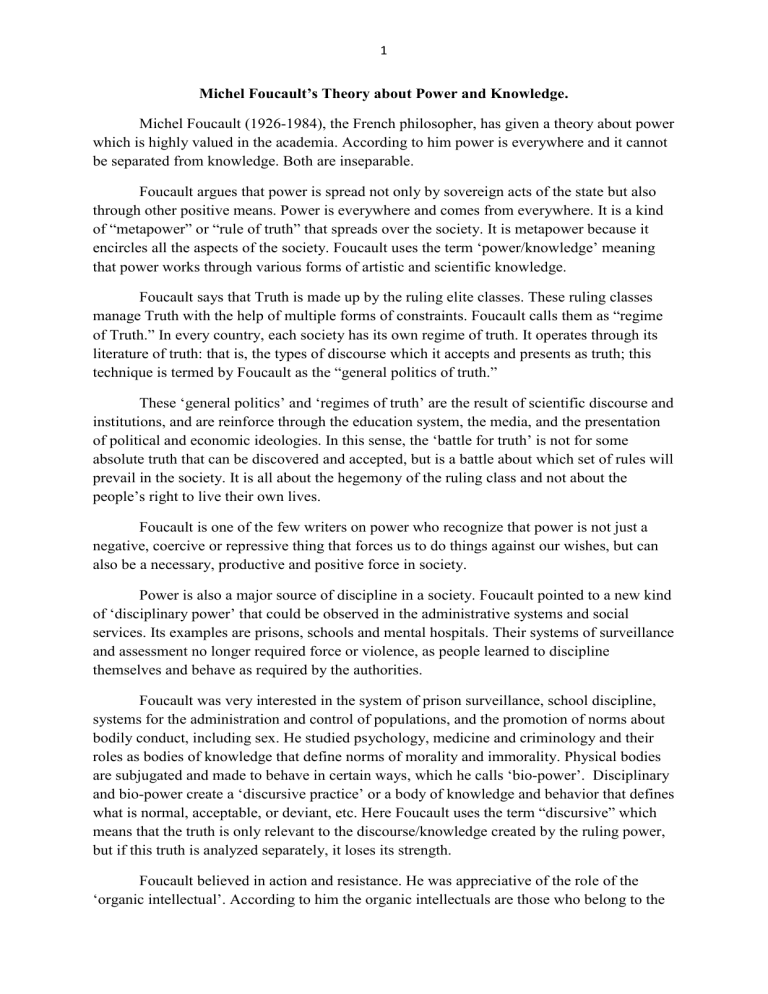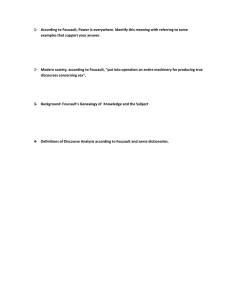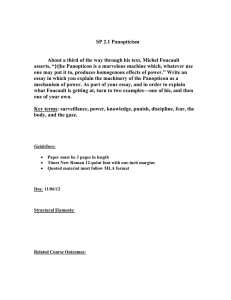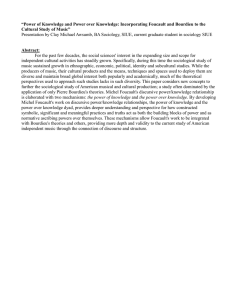
1 Michel Foucault’s Theory about Power and Knowledge. Michel Foucault (1926-1984), the French philosopher, has given a theory about power which is highly valued in the academia. According to him power is everywhere and it cannot be separated from knowledge. Both are inseparable. Foucault argues that power is spread not only by sovereign acts of the state but also through other positive means. Power is everywhere and comes from everywhere. It is a kind of “metapower” or “rule of truth” that spreads over the society. It is metapower because it encircles all the aspects of the society. Foucault uses the term ‘power/knowledge’ meaning that power works through various forms of artistic and scientific knowledge. Foucault says that Truth is made up by the ruling elite classes. These ruling classes manage Truth with the help of multiple forms of constraints. Foucault calls them as “regime of Truth.” In every country, each society has its own regime of truth. It operates through its literature of truth: that is, the types of discourse which it accepts and presents as truth; this technique is termed by Foucault as the “general politics of truth.” These ‘general politics’ and ‘regimes of truth’ are the result of scientific discourse and institutions, and are reinforce through the education system, the media, and the presentation of political and economic ideologies. In this sense, the ‘battle for truth’ is not for some absolute truth that can be discovered and accepted, but is a battle about which set of rules will prevail in the society. It is all about the hegemony of the ruling class and not about the people’s right to live their own lives. Foucault is one of the few writers on power who recognize that power is not just a negative, coercive or repressive thing that forces us to do things against our wishes, but can also be a necessary, productive and positive force in society. Power is also a major source of discipline in a society. Foucault pointed to a new kind of ‘disciplinary power’ that could be observed in the administrative systems and social services. Its examples are prisons, schools and mental hospitals. Their systems of surveillance and assessment no longer required force or violence, as people learned to discipline themselves and behave as required by the authorities. Foucault was very interested in the system of prison surveillance, school discipline, systems for the administration and control of populations, and the promotion of norms about bodily conduct, including sex. He studied psychology, medicine and criminology and their roles as bodies of knowledge that define norms of morality and immorality. Physical bodies are subjugated and made to behave in certain ways, which he calls ‘bio-power’. Disciplinary and bio-power create a ‘discursive practice’ or a body of knowledge and behavior that defines what is normal, acceptable, or deviant, etc. Here Foucault uses the term “discursive” which means that the truth is only relevant to the discourse/knowledge created by the ruling power, but if this truth is analyzed separately, it loses its strength. Foucault believed in action and resistance. He was appreciative of the role of the ‘organic intellectual’. According to him the organic intellectuals are those who belong to the 2 poor and struggling classes. To challenge power is not a matter of seeking some ‘absolute truth’ but able to produce its own truth discourse/knowledge. Discourse which is also called knowledge can be a site of both power and resistance. Foucault says that Discourse transmits and produces power. It also reinforces it. Foucault’s theory about the relationship between Power and Knowledge is important as it provides for critical analysis of the prevailing system of discourse in the society. It helps to understand the nature and purpose of the power and its hegemony in the society at the whole.



